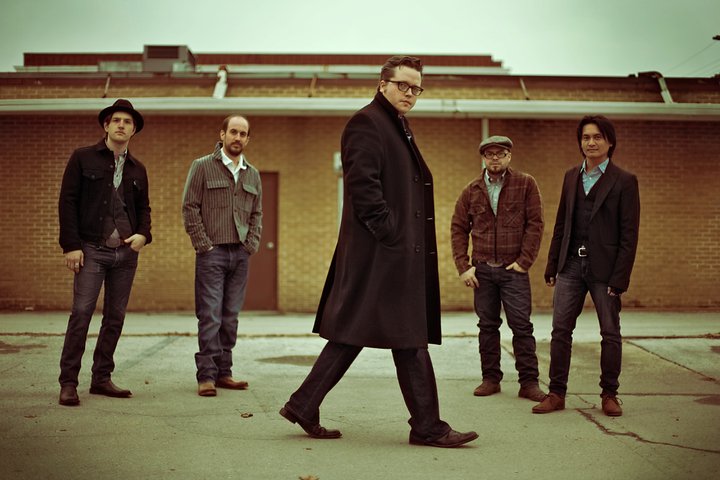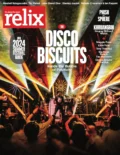
Contrary to what some may think, Jason Isbell was not born in the fall of 2001. That might have been when he first caught the music world’s ear as a member of the Drive-By Truckers, but the man performed his first a cappella vocal as a newborn on February 1, 1979.
The Trucker years and all that went with them were without question an important chapter in Isbell’s life – and he has nothing but good to say about his former bandmates, whom he parted working ways with in 2007. But there really is a whole lot more to Jason Isbell than being a “former Drive-By Trucker,” as proven by Here We Rest, the latest release from Isbell and his band, the 400 Unit.
And while we’re clearing up misconceptions, here’s another one concerning the 400 Unit, consisting of Browan Lollar (guitar), Derry deBorja (keys), Jimbo Hart (bass), and Chad Gamble (drums): the band’s name is not some sort of a military reference – a tribute to a company of brave soldiers, for instance. That would be an easy assumption to make, as Isbell has written some exceptional songs that capture the heart and soul of our veterans. (We’ll talk more about that later.)
The fact of the matter is, the inspiration for the 400 Unit’s name came from a ward at a local nervous hospital in Alabama. Isbell’s experience with some of the 400 Unit’s patients out for a few hours in the institution’s van definitely hit home with his own on-the-road life as a working musician. Says Isbell, “Seeing those folks reminded me so much of a band: they were in this place, all confused, and just looked like they didn’t belong. All they wanted was just to get something to eat, you know? I’d felt that feeling so many times, crawling out of the van in some random town at 1 or 2 o’clock in the afternoon … trying to find some food, scaring all the locals, and knowing that you didn’t fit in.”
That’s Jason Isbell: an observer with a good ear; a humorist with a twist; a chain-smoking pool shooter with a good heart and appreciation for a well-crafted sentence. And above all else, Isbell’s a soul man, born and raised on the vibes of Muscle Shoals.
Jambands.com recently had the opportunity to talk with Isbell about life, words, music, and a great liquor store to hit if you’re ever in Alabama on a Sunday.
Here in his own words is Jason Isbell.
Early music and non-guilty pleasures:
It seems like there was always music in my life. I guess I was so young that I really can’t say whether it was a mandolin, banjo, or guitar that I first tried to learn how to play. I never considered it as an occupation until I got older …. playing was just something you did everyday, like feeding the chickens or something.
I had an opportunity at 11 or 12 to play in a local band. That’s when I really started getting into rock records from the 70s and what was on the radio in the 80s. I loved Prince and Crowded House and ‘Til Tuesday … I just loved that 80’s pop, man. I saw Crowded House in Australia last year and I was just jumping up and down and videotaping with my phone like your typical kid at a concert. It was great.
I still look back at that stuff and feel like it holds up really well … I really do. I think a lot of that music is incredible.
High school and bars:
The first times I actually played in public were here at home in high school. I played in country bands and cover bands; that kind of thing. My best friend Chris Tompkins – he’s a songwriter in Nashville now – got me into my first band. They were trying to hire a keyboard player and Chris told them that he wouldn’t be in the band unless they hired me, too. He made it so they had to drag me along.
We played a lot of shows in bars: they’d rope off a corner of the bar where we could play and not drink, you know? We actually played at the Opry in Nashville once … played some talent contests and stuff like that. We got beat out of one contest by John Paul White from The Civil Wars. I still remember that … I don’t mind it much at all now, but it really pissed me off when I was 16. (laughs)
The Muscle Shoals influence:
I’m still not sure exactly what Muscle Shoals meant to me growing up. I hope I’m continuously surprised by how much people care about the music that comes from this place.
I guess I was 17 or 18 years old when I first started running into some of the folks who had made some of that great Muscle Shoals music. They would come out to bar gigs to see us play and we’d have a chance to talk with them. They were all really sweet people.
It’s not like they’d say “Oh, I wrote this song” or “I played on this song” – nothing like that. It wasn’t until after getting to know them that I went back and started looking at what they’d done. It amazed me that they were as humble and as generous as they were – all of them.
I always think of Patterson’s dad, David Hood, when I’m talking about those guys. David always acted like a family member to me – even before Patterson and I played together; even before I met Patterson. David was really a mentor as far as those things went. I don’t know if he felt some sort of a kinship or he’s just that nice of a guy … I really don’t know. He was always really great.
I really think that everybody in town wants the music from here to be as good as it can be. It’s not a fluke that it all came together the way it did.
I think about the way those guys would reach out to us when we were playing in bars and try to help us. That’s not their job … I mean, they’re trying to get work and keep themselves busy, too. But that’s what they did for me.
Mr. Isbell, English teacher:
After high school, I went to college in Memphis and lived there for a few years. I really started focusing on writing songs at that point. I didn’t play out much at all – I really just woodshedded and focused on reading as much and writing as much as I could.
I took creative writing with the idea of writing songs. It was either that or a music degree. I had some decent music theory and I could sight-read. I learned to play trumpet and French horn in high school and played in college for a while, too.
But I’d gotten an academic scholarship and I really didn’t want to focus all my time on music – what I felt I lacked the most was the ability to write really precisely. I also just wanted to read as much as possible at that point in time, so I’d get a lot of good suggestions from friends at school.
I guess I could’ve been an English teacher, but … I don’t think it would’ve made me happy. (laughs)


No Comments comments associated with this post